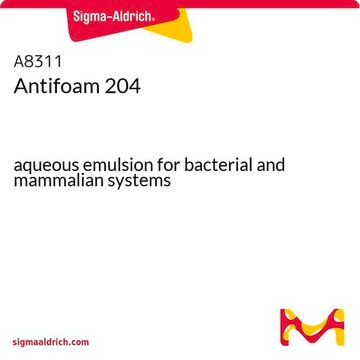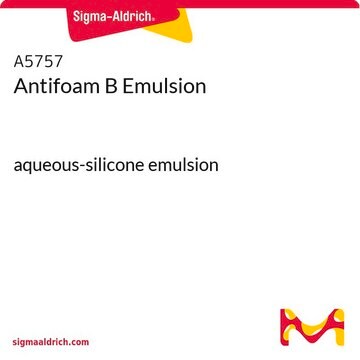A6426
Antifoam 204
mixture of organic polyether dispersions
Synonym(s):
organic antifoam
Sign Into View Organizational & Contract Pricing
All Photos(1)
About This Item
Recommended Products
biological source
synthetic
Quality Level
form
liquid
technique(s)
microbiological culture: suitable
viscosity
400 cP(lit.)
density
1.01 g/cm3 at 25 °C (lit.)
storage temp.
room temp
Looking for similar products? Visit Product Comparison Guide
General description
Antifoam function as an effective foam suppressor. Antifoam 204 contains 100% active components and is a mixture of organic non-silicone polypropylene-based polyether dispersions. It does not contain mineral oil. Antifoam 204 can itself be considered a surfactant, but it contains no other surfactants. This product is synthetic and not derived from animal or plant sources. Antifoam 204 can be sterilized repeatedly. The flow properties of Antifoam 204 are such that it can be pumped to a fermenter on an as-needed basis. For use in microbiological media, Sigma recommends a starting concentration of between 0.005% and 0.01%.
Application
Antifoam 204 has been used:
- to suppress bubbling in thylakoid solutions during intramembrane isoprene quantification
- as a component of fed-batch continuous culture fermentation medium
- to suppress severe foaming in fermenter
Features and Benefits
- Highly versatile surfactant for your cell biology and biochemical research
- Suitable for microbiological culture
Other Notes
Contains 100% active components and is a mixture of non-silicone organic defoamers in a polyol dispersion. Can be sterilized repeatedly.
For additional information on our range of Biochemicals, please complete this form.
Storage Class Code
10 - Combustible liquids
WGK
WGK 3
Flash Point(F)
Not applicable
Flash Point(C)
Not applicable
Certificates of Analysis (COA)
Search for Certificates of Analysis (COA) by entering the products Lot/Batch Number. Lot and Batch Numbers can be found on a product’s label following the words ‘Lot’ or ‘Batch’.
Already Own This Product?
Find documentation for the products that you have recently purchased in the Document Library.
Customers Also Viewed
Ultrasound-assisted fermentation enhances bioethanol productivity
Sulaiman AZ, et al.
Biochemical Engineering Journal, 54(3), 141-150 (2011)
Physiology of Aspergillus niger in oxygen-limited continuous cultures: Influence of aeration, carbon source concentration and dilution rate
Diano A, et al.
Biotechnology and Bioengineering, 103(5), 956-965 (2009)
Martin Kavšček et al.
BMC systems biology, 9, 72-72 (2015-10-28)
Yarrowia lipolytica is a non-conventional yeast that is extensively investigated for its ability to excrete citrate or to accumulate large amounts of storage lipids, which is of great significance for single cell oil production. Both traits are thus of interest
Juan J Barrero et al.
New biotechnology, 60, 85-95 (2020-10-13)
Pichia pastoris (Komagataella spp.) has become one of the most important host organisms for production of heterologous proteins of biotechnological interest, many of them extracellular. The protein secretion pathway has been recognized as a limiting process in which many roadblocks
Vasil D'Ambrosio et al.
Metabolic engineering, 61, 369-380 (2020-07-28)
Engineering living cells for production of chemicals, enzymes and therapeutics can burden cells due to use of limited native co-factor availability and/or expression burdens, totalling a fitness deficit compared to parental cells encoded through long evolutionary trajectories to maximise fitness.
Our team of scientists has experience in all areas of research including Life Science, Material Science, Chemical Synthesis, Chromatography, Analytical and many others.
Contact Technical Service









